Selecting the right checkweigher
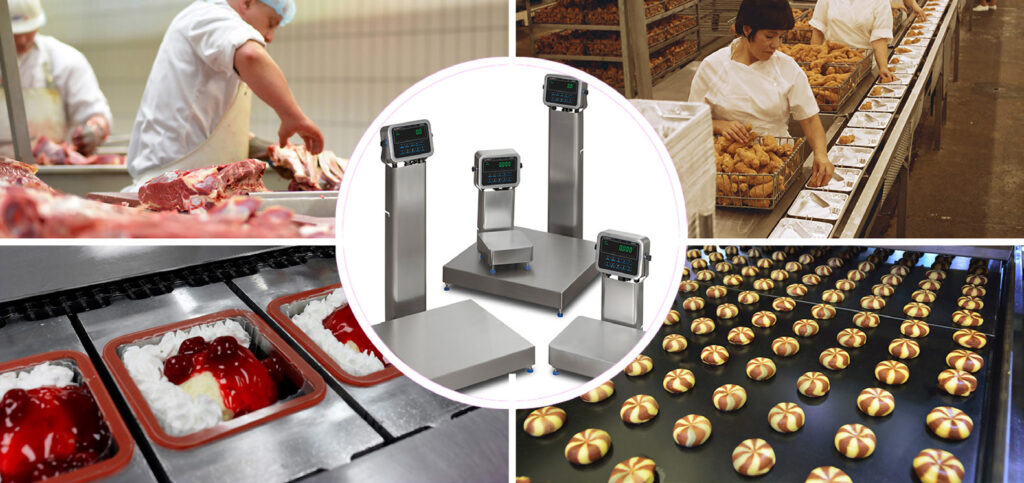
Most checkweighers on the market are used in repetitive weighing applications to:
- Guarantee the product being sold remains within the correct weight range agreed by the customer.
- To help reduce unwanted giveaway which costs money.
- To stop products being rejected and returned due to them being underweight.
- Used to check finished products by weight to make sure no components are missing.
- If legal for trade, they are used on the end of a production line to calculate price for labeling.
- Used as vital QA inspection step within a process line to guarantee the line runs as efficiently as possible and to spot any potential line failures before they happen.
- Used to help gather vital weight data to spot trends on a busy process or production line.
What type of checkweigher are you looking for?
On a lot of process lines there is normally a mixture of checkweighers being used for different reasons. Today most process lines use a mixture of both in motion, multi head carousel and static checkweighers within their lines.
- The static checkweighers are normally used in areas where raw meats, fish or soft fruits need to be processed by hand or where soft fruits need to be packed carefully to avoid bruising.
Static checkweighers are also heavily used by QA inspectors to regularly monitor and check that the product stays within tolerance at different steps of the process to guarantee the production line is running smoothly. - Most in-motion checkweighers are normally used closer to the end of the process line as a final check after the goods have already been packed.
- Multi-head carousel checkweighers are mostly used on fully automated packing lines and work by quickly building up the required packed weight from 16 mini weight head scoops. The scale quickly calculates the weight on each scoop and only tips in the scoops that add up to the correct final packed weight.
Static checkweighing displayed data: Checkweighers need to be fast and very simple to use with simple visual aids to help identify when the weight is within the accept band windows. If there is too much data being displayed on the screen, this can slow down the operator over time. Some customers prefer the operator does not see the weight data but focus instead on the under over and accept bands identifiers.
Scale construction & cleaning: Checkweighers are dominantly used today within food processing applications so, need to be designed to be hygienic to use and easy to clean with little to no bug / bacteria traps. Food safety is very important to most food processing factories and more of them now require much higher cleaning standards (like IP69K) to allow them to be regularly washed down with high pressure steam, water and detergent. Using a product that already has a credited foods safety certificate like NSF or EHEDG helps to reassure customers that the product has already been correctly designed and tested for use within a food environment. Today customers still prefer food grade stainless steel scales over lower cost plastic scales that can easily get scratched and become hard to keep clean over time.
Hygiene & food safety: In any food processing operation, hygiene & food safety are always one of the main concerns when selecting new equipment. This job can be made much easier if the product selected already has an active hygiene certificate like EHEDG or NSF to prove the product design has already been inspected and classed as being safe for use within a food contact area. For products without any of these certificates, a much closer product evaluation must be done to check for possible bug / food trap areas, hard to clean corners and open thread areas where bacteria can hide. All weld areas need to be inspected for continuous welds. Structures that are made up from stainless-steel tubular sections are also not recommended, even when professionally seam welded these can still harbor unwanted bacteria that can leach out over time through micro cracks within the weld area.
Reduced down time: Checkweighers that are used within a food processing area need to be very reliable as they will take a lot of abuse from the operators and the cleaning staff. In this harsh environment, a lot of the lower cost scales can easily be destroyed within hours.
Scales with reliability issues soon become costly to repair or replace and can easily stop a complete production line. To get around this, most food processing lines carry replacement units that can quickly be swapped out if needed.
When it comes to failures, two of the most common fault areas come from load cell damage or water ingress inside the scale.
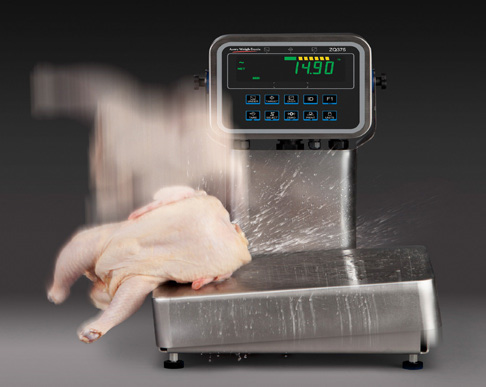 Load cell damage normally occurs on scales that have not been correctly designed for this type of application and do not have the correct overload or shock load protection required for this type of work and abuse.
Load cell damage normally occurs on scales that have not been correctly designed for this type of application and do not have the correct overload or shock load protection required for this type of work and abuse.
80% of all food processing static checkweighers use a scale with capacities under 30 lb / 15kg. This also means these scales are much more susceptible to overload damage, if not adequately protected. Our ZQ375 Checkweighers use our torsion base design which has 500% overload and shock load protection. This helps to dampen out all harmful shock load forces away from the stainless steel load cell within the base.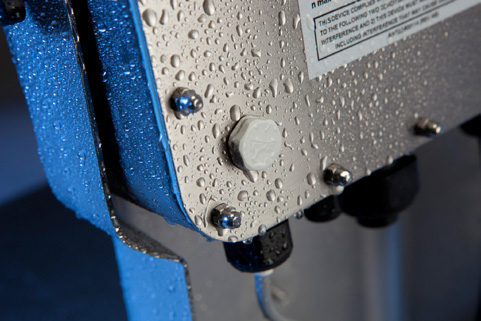 Water ingress failures can occur due to three main failure areas: wrongly fitting cable glands, poorly designed case enclosures or from damage to the overlay.
Water ingress failures can occur due to three main failure areas: wrongly fitting cable glands, poorly designed case enclosures or from damage to the overlay.
Today food grade checkweighers must be designed to remain watertight even with massive shifts in temperature. These scales must also survive the cool temperature of a food production line to the extreme high pressures and high temperatures from cleaning.
Scales that do not have a way to neutralize this temperature / pressure shift within the scale can quickly be subjected to a capillary action that sucks in moisture though seals, gaskets, or cuts in the overlay. Today, our ZQ375 scale controls this with cleverly designed gore vents that have been designed into the product to keep the water out, but allow the enclosure to breathe and neutralize any capillary action from taking place.
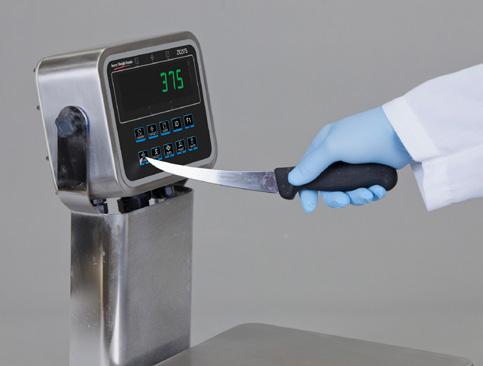 Knife proof overlays: Today most enclosure failures occur on the lower cost checkweighers from overlay key damage due to constant knife presses of set keys. Although key knife presses are not recommended, this is still a regular occurrence on any busy meat cutting floor. High end checkweigher manufacturers get around this by building in a special knife protect layer within the overlay or to use external tare switches linked to photo eyes or foot pedals to remove the need to touch the overlay with a knife.
Knife proof overlays: Today most enclosure failures occur on the lower cost checkweighers from overlay key damage due to constant knife presses of set keys. Although key knife presses are not recommended, this is still a regular occurrence on any busy meat cutting floor. High end checkweigher manufacturers get around this by building in a special knife protect layer within the overlay or to use external tare switches linked to photo eyes or foot pedals to remove the need to touch the overlay with a knife.
Speed: The checkweigher’s stability needs to be less than ½ second and much faster than any operator can work, if not, the operator wasted time waiting for the scale to be stabilized.
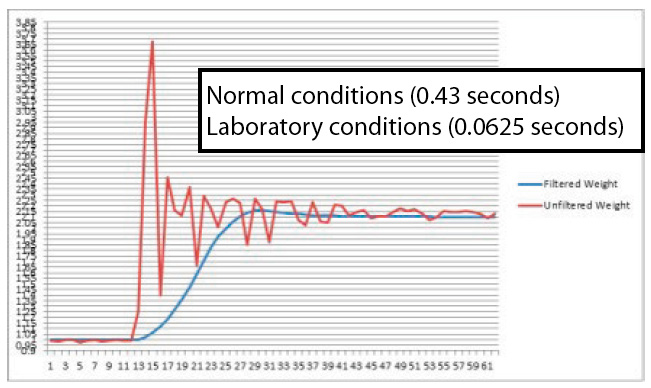
PLU Line Setup time: Being able to store or quickly change the target weight parameter on the scales is crucial for any busy food process or packing line. On average, scales used on a food processing or packing line are swapped out daily and replaced with recently cleaned and sanitized units. With 8 to 16 scales per line, any lengthy setup of the target tolerances can soon become a costly exercise. Today most checkweigher customers expect the line to be setup and running in under 5 minutes or around 15 seconds setup per scale. This can easily be achieved in several ways.
- Using prestored PLU data stored within the scale that can be quickly recalled, when needed, either through the front panel or from a local PC.
- Remote setup from a PC using Wi-Fi or ethernet connection.
- Using a known test weight, you can set your target weight bands by placing the test weight on the scale and pressing the ‘target key’ on the checkweigher.
Data capture: Most food production process lines are driven to be fast and efficient with very little breakdowns. Controlling the process line is not just keeping the line workers and packers working efficiently. These checkweighers are also being used to gather other valuable weight data in the background in order to allow the line to remain running as efficiently as possible.
Today there are more static checkweighers being used by quality inspectors, for monitoring key steps within a process, than being used at the end of a line for packing.
This data can be as simple as just recording every stable weight for standard deviation analysis to capturing more statistical data like X bar R for tracking trends within the process line.
This can also be used to quickly identify vital machine adjustments that need to be done throughout a shift, or to identify a potential machine failure long before the actual failure occurs.
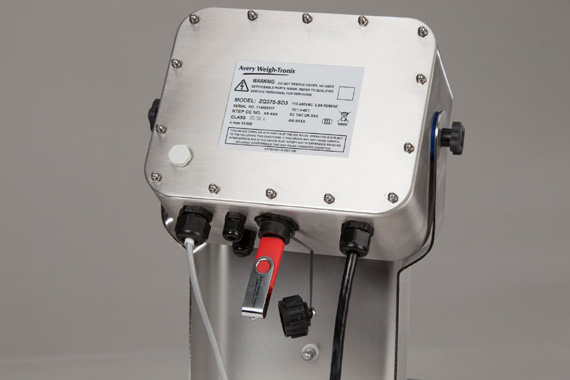 Data retrieval: Today, unless the checkweighers being used are very basic scales, most modern checkweighers come with the ability to transmit and receive data directly into and out of the scale.
Data retrieval: Today, unless the checkweighers being used are very basic scales, most modern checkweighers come with the ability to transmit and receive data directly into and out of the scale.
Subject to the scale being used, there is normally a number of different communication port methods available from RS-232, USB, Ethernet to Wi-Fi. Although this data is invaluable for many process lines, running data lines within a food safe washdown area is not always possible and can also be costly to install. Scales like our ZQ375 Checkweigher can still be used to collect this data and store it internally without any comm ports being connected. This data can then be quickly retrieved by any passing quality inspector just by plugging in a portable USB memory drive into the ZQ375. Once plugged into the ZQ375 USB port, the ZQ375 will automatically download all the required stored data directly to the USB drive without slowing down the operator.
Legal-for-trade over non-legal for trade: A lot of static checkweighers carry a NTEP or EC approval for use within legal-for-trade applications. However, 80% of the applications with static checkerweighers being used don’t require legal-for-trade scales. Using a scale that can be approved in an unapproved application gives reassurances to the user that the scales will deliver the accuracy required to keep their process line running efficiently.
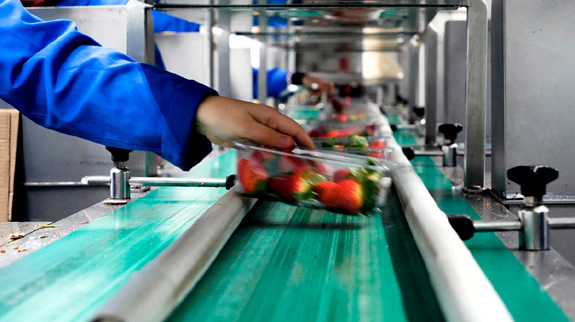 The cost of success: In today’s fast-moving society, with increases in inflation and the price of raw materials constantly rising, manufacturers must constantly look at ways to improve efficiencies throughout their lines.
The cost of success: In today’s fast-moving society, with increases in inflation and the price of raw materials constantly rising, manufacturers must constantly look at ways to improve efficiencies throughout their lines.
Today, are you getting the most out of the checkweighers that you are now using? Are your scales just being used for packing or are you also capturing other vital data in the background to help you improve your process or the product you make?
Avery Weigh-Tronix’s specializes in the fully stainless steel, static checkweighing applications to provide a fast, accurate and robust food safe solution. This is ideal for use on any cutting floors or packing lines, that can also provide quality inspectors the vital weight data needed to keep fast-moving process lines working efficiently.

 United States
United States  Canada
Canada  Canada (fr)
Canada (fr)  India
India  Malaysia
Malaysia  Ireland
Ireland